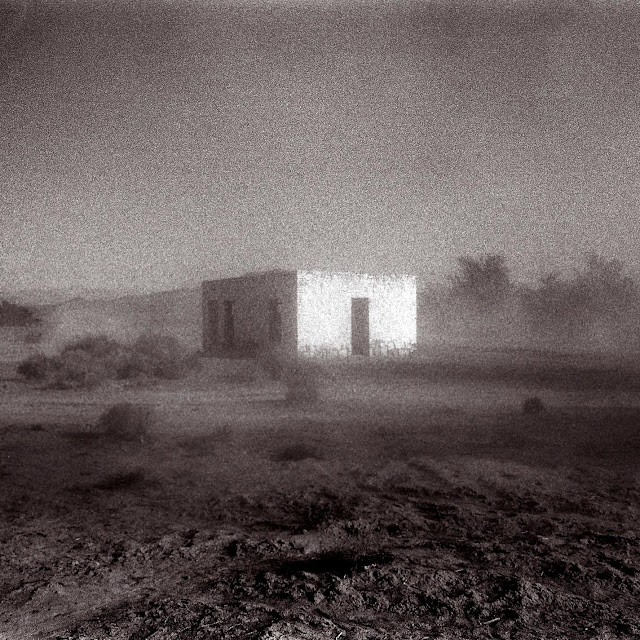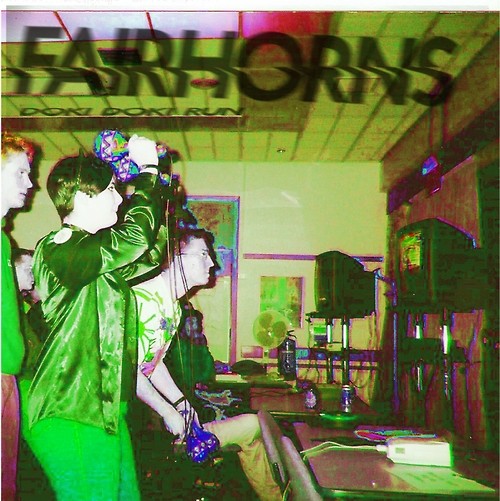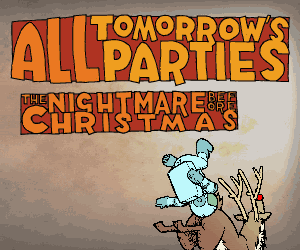
4 become 3 for the majority of their opening sequence in which their propensities for Medieval chanson spring to a consummately seasonal life. From Salve virgo virginum and Salve virgo regia to bright estival hymnal Shall We Gather at the River and classic trad. ballad Poor Wayfaring Stranger the three comprised of Ruth Cunningham, Jacqueline Horner-Kwiatek and Marsha Genensky are instantly infinitely more appealing for the most part (or at least of substantially greater intrigue for the remainder) than most dreary supporting casts.
However it's evidently Darnielle who most are here for and his succinct career-spanning set is a joy to behold. Adorned in stiff blue blazer, he's one garish yellow polo shirt away from becoming one of those haranguing WinkBall drones to linger outside venues into which they're never to be admitted, whatever the weather. His mood jovial and demeanour strangely sunny, he bounds onstage only to immediately saddle up to the piano, the instrument upon which he later professes to be most proficient ("I'm practically incompetent on the guitar" he concedes). Having returned to its ebonies and ivories lately, the monochromatic teeth to the grand beast stage-right are periodically pulled to stunning effect. However first he must succumb to a so-called nervous tick, as he emphatically pronounces: "Hi, we're the Mountain Goats", prior to gliding into Transcendental Youth, the conscious title track of the evening and one inspired by "the casting off of the demons of darkness." On tonight of all nights it becomes as patent as ever previously that Darnielle is this band and indeed this band is he thus all to have ambled alongside him ultimately become all but extraneous to the Mountain Goats as perennial entity. However that he sits with his back turned to the hushed throng of the auditorium suggests nerves are aquiver as he aims to enthral; alone.
And enthral he does as he flounces from pianoforte to his chintzy electroacoustic that's stood at the other end of the stage, carting song notes and lyrics in pale imitation of "the frustrated English professor I always was" as he trundles. Only as he potters from its one extent to t'other is its tremendous stature truly ascertained and intermittently the venue itself is too sizeable for Darnielle's inherently intimate rich narratives and vigorously strummed acoustics. Bride for instance, written as an ode to the cinematically enslaved Bride of Frankenstein (allegedly "the finest film ever made"), sees its flickering existential spark extinguished in such vast expanse and as Darnielle keeps his head lowered, furiously stomping a foot, he appears to emulate an angered teen in turn emulating the shiniest stars of rawk behind plasterboard doors slathered in explicit poster. Moreover, Isaiah 45:23 is – albeit somewhat inexplicably – as insipid as the verse that first enkindled it.
Cut Off Your Thumbs meanwhile resonates with a significantly superior degree of success: the evening's umpteenth "song about madness", as the lights turn a sanguine shade and Darnielle seethes: "I'm gonna kill everybody in this room" the foreboded bloodshed feels almost coherently imminent. In the Shadow of the Western Hills too, another newly penned paean rejuvenates similarly, its erudite canyon-filling Americana gingerly offset by the harsh twang of cheap acoustic whilst Genesis 3:23, included at Owen Pallett's insistence, perfumes every particle of air within the hall with Darnielle's soothing, if extraordinarily unremarkable vocals. Yet during a set in which the lack of rhythm section renders the thing a little hollow and even the odd solitary stomp of rubber sole adds exponentially it's the painless yet sardonic evanescence of Your Belgian Things that stuns into shattered-jaw stupor and, although influenced by the subjective glorification of belongings that are but "opaque, unreadable symbols to everyone else", it's promptly apparent that here Darnielle has a song that means an inordinate amount to an immoderate number.
These two creative forces are then conjoined, with Pallett too wading into the heartwarmingly gooey mélange. Looking every bit the Victorian gent, hair slicked back and adorned in debonair period regalia his presence in the City of London is duly noted as an apt one and indeed only drafted in at short notice to step in for the lamentably inconvenienced Susan Hellauer, it's a consummate thrill to have the arranger of Transcendental Youth in on its doleful actions. If he may look somewhat girlish, his vocals too fit such billing, barely discernible amidst the swooping harmonies summoned by the well-versed trio stood beside him and behind music stand. Thus how effectively do the compositional talents of Pallett, the sublime harmonies of the Anonymous 4 and the wry parables of Darnielle coincide? In the show's programme notes Darnielle is quoted: "Beethoven with a disco beat... It's cool. It's good to dance to. But it's not the same as genres actually meeting and borrowing from one another..." and although Until I Am Whole interweaves his exploration of the arduousness located innately within mental illness with the Anonymous 4's anachronistic vocals, this hybridised amalgam isn't entirely as cohesive as he obviously opines. White Cedar certainly sounds as though it ought to be encased within We Shall All Be Healed while In Memory of Satan includes some interesting juxtapositions of grandiose styles alongside befuddling lyrics of watching "the sky go dark" from the discomfort of park bench.
When this intricate weave seems seamless however it's a quite resplendent event: a capella number Lakeside View Apartments Suite proves to be rather perfetto and absorbingly recalls moments of Mr. West's My Beautiful Dark Twisted Fantasy as Darnielle's satirical outbursts hack clumsily through finely threaded vocal mellifluousness. Equivalently the avifaunal swooping of Spent Gladiator ensures it pricks the ear: although penned in as Spent Gladiator One on the evening's setlist it is in fact Spent Gladiator Two that is aired and Darnielle feels compelled to reassure all that this momentary slip will become "clearer in the fall" in an albeit slight insinuation of the life of the record to come. Indeed it ought to be expressed too that the glorious vocal impeccability oohed and ahed from the Anonymous 4 (who prove central both figuratively and physically throughout), once matched up with the superlative acoustics of the Barbican Centre, already sounds as though ripped from the highest quality recording. However aside from a stirring collaborative rendition of 1 John 4:16 between Darnielle and Pallett, the spheres containing past and future regrettably remain mutually exclusive to evoke a sense that 'the twin planets of rock music and classical music', although tonight quite finely attuned, are never quite aligned.























